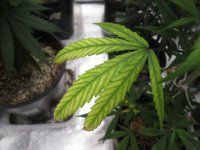I am noticing that my PH'd water drifts higher when I don't use it promptly. Is this normal? I fill jugs with city water,then ph to 6.6 or so. I then notice that when I check water that has sat for several days,that the PH has risen again. Anyone else experience this?
It has to do with the Hydrogen atoms in your water.
C02 in your atmosphere, air stones oxygenating your water. Chlorine evaporating although I'm not sure if that actually affects the pH.
...I'm way too stoned to get into it right now, but there's science behind it.
In ideal application, leave your water aerated 24 hours before you mix your nutes, and then adjust pH last. (Or mix, adjust and use, but know you'll be adjusting again the next time you go to use it.)
-----
edit:
Carbon Dioxide Absorption: When water is exposed to the air, it can absorb carbon dioxide (CO2) from the atmosphere. Carbon dioxide dissolves in water to form carbonic acid (H2CO3), which can lower the pH of the water. The reaction is as follows:
CO2 + H2O → H2CO3
The increase in carbonic acid can make the water more acidic, leading to a decrease in pH.
Carbon Dioxide Loss: If the water is exposed to air, it may lose dissolved carbon dioxide (CO2) to the atmosphere. This loss of CO2 can lead to a decrease in carbonic acid concentration in the water. Since carbonic acid is a weak acid, its decrease can result in a rise in pH. The reaction is reversed from the one mentioned earlier:
H2CO3 → CO2 + H2O
As carbonic acid breaks down, the pH of the water increases.


















